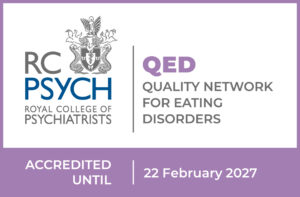What is Bulimia nervosa?
Bulimia nervosa (commonly known as ‘bulimia’) is a type of eating disorder that is a serious mental health condition. It is characterised by a destructive cycle of bingeing followed by compensatory behaviours such as self-
The cycle of bulimia is usually triggered by uncomfortable feelings, such as sadness, stress or hunger. Sufferers will tend to set very strict rules and regimens for themselves surrounding eating, dieting and exercise.
Eating disorders have the highest rate of mortality amongst any other mental health condition, therefore it is vital that individuals seek professional support.
Recovery is possible, and early intervention usually indicates more positive outcomes.
Bulimia nervosa often starts in the mid-teens. However, people don’t usually seek help for it until their early to mid-twenties because they are able to hide it, even though it affects their work and social life. People most often seek help when their life changes – the start of a new relationship or having to live with other people for the first time.
About 4 out of every 100 women suffers from bulimia at some time in their lives, rather fewer men.
Signs and symptoms of bulimia nervosa
Psychological signs and symptoms of bulimia nervosa can include:
- Extensive worry about weight, gaining weight and calories
- Anxiety
- Depression
- Guilt
- Shame
- Isolation
- Become obsessive about food and eating (and sometimes other things such as washing, cleaning or tidiness)
Behavioural signs and symptoms of bulimia nervosa can include:
- Frequent trips to the bathroom (to vomit or due to laxative/diuretic use)
- Secrecy
- Unwilling to eat in front of others
- Having smaller meals and portions in front of others
- Developing food rituals (for example, only eating the same items)
- Hoarding food
- Unwilling to participate in things you used to enjoy
Physical signs and symptoms of bulimia nervosa can include:
- Irregular menstrual periods
- Feel tired, weak and cold (a sign of the body’s metabolism slowing down)
- Constipation
- Bloating from fluid retention
- Stained teeth
- Callouses on hands/knuckles from self-induced vomiting
- Liver damage
- Brittle bones that break easily
- Infertility
- Not growing to your full height (if teen or pre-teen)
- In extreme cases, death. Eating disorders have the highest mortality rate of any mental health condition.
Long-term effects of purging
If you vomit, you may:
- Lose the enamel on your teeth (it is dissolved by the stomach acid in your vomit)
- Get a puffy face (the salivary glands in your cheeks swell up)
- Notice your heart beating irregularly – palpitations (vomiting disturbs the balance of salts in your blood)
- Feel weak
- Feel tired all the time
- Damage your kidneys
- Have epileptic fits
- Be unable to get pregnant
If you use laxatives regularly, you may:
- Have persistent stomach pain
- Get swollen fingers
- Find that you can’t go to the toilet anymore without using laxatives (using laxatives can damage the muscles in your bowel)
- Have huge weight swings. You lose lots of fluid when you purge, but take it all in again when you drink water afterwards (no calories are lost using laxatives)
What causes bulimia nervosa?
You may be at higher risk of developing bulimia nervosa if you:
- Have a family history of eating disorders, addiction or depression
- Are self-conscious, have anxiety, low-self esteem or an obsessive personality
- Have been criticised for your body shape or weight
- Have a history of trauma
Treatment for bulimia nervosa at Nightingale Hospital
Nightingale Hospital has a Quality Eating Disorder accreditation, provided by the Royal College of Psychiatrists. This means that when you’re seeking eating disorder treatment at Nightingale Hospital, you can be sure that you will be receiving trusted and effective clinical care of the highest degree.

We have the expertise in eating disorders to approach the support and treatment we offer adults and adolescents in a personal and flexible way to benefit you the most in your recovery. Bulimia nervosa treatments at Nightingale Hospital can take place as an outpatient, day patient or inpatient.
Based on current clinical evidence and put into practice by an experienced, multidisciplinary team of consultant psychiatrists, unit doctors, nurses, a dietician and specialist therapists, our approach to bulimia treatment at Nightingale Hospital London is tailored to the individual.
Therapies
Through intensive psychological and emotional support in group therapy sessions and individual counselling and psychotherapy, you can understand underlying factors that have contributed to your bulimia and find strategies to overcome the eating disorder. Cognitive Behavioral Therapy can help you identify your negative thoughts and learn more positive emotional and behavioural responses to your beliefs about yourself and your eating. Family therapy can improve the way family members relate to each other and communicate and Occupational Therapy can support you practically in returning to a normal life away from your eating disorder.
Aftercare for inpatients
It can be difficult adjusting to life eating disorders after an inpatient admission, so we offer a step-down programme to our eating disorders daycare, individual counselling and free aftercare groups post inpatient treatment to sustain motivation for living free from an eating disorder.
Family support groups for inpatients
Those nearest to the sufferer often blame themselves, going through a range of emotions from despair, depression and guilt to anger and frustration, leaving them exhausted and having difficulty coping, as well as feeling powerless in how to deal with the situation.
Research has shown that the involvement of families in the treatment process greatly increases the prospects of a person’s recovery.
Recent family support group feedback
- “It was good to meet up with other people who understand the complexities of caring for a loved one with an eating disorder. The group was well-led. Joanna is very knowledgeable and took the time to listen to everyone even though there were many needs and peoples at different stages of the journey.”
- “We cannot thank you enough for the education and advice this group has offered and the chance to discuss our questions with yourself and other careers of loved ones. We would be grateful if we could attend future Zoom meetings. We have started to read the advised book and already this is becoming of great help. Thank you again, Joanna.”
Bulimia specialists at Nightingale Hospital
Nightingale Hospital London has a number of consultant psychiatrists and therapists that can help you through your bulimia. It is vital you find an eating disorder specialist that you can trust and work with on your recovery.
Our team is led by:
- Dr Helen Murphy, Consultant Psychiatrist, Nightingale Hospital Lead Consultant for Eating Disorders
Please contact us confidentially on 020 7535 7700 24 hours a day.
Do I have bulimia nervosa? How can I help myself?
- Do you make yourself sick because you’re uncomfortably full?
- Do you worry that you’ve lost control over how much you eat?
- Have you recently lost more than 6 kilograms in three months?
- Do you believe you’re fat when others say you’re thin?
- Would you say that food dominates your life?
If you answer ‘yes’ to two or more of these questions, you may have a problem with your eating. We encourage you to get in touch with us to discuss this further.
Helping yourself
Do:
- Stick to regular mealtimes – breakfast, lunch and dinner. If your weight is very low, have morning, afternoon and nighttime snacks.
- Try to think of one small step you could take towards a healthier way of eating. If you can’t face eating breakfast, try sitting at the table for a few minutes at breakfast time and just drinking a glass of water. When you have got used to doing this, have just a little to eat, even half a slice of toast – but do it every day.
- Keep a diary of what you eat, when you eat it and what your thoughts and feelings have been every day. You can use this to see if there are connections between how you feel, what you are thinking about, and how you eat.
- Try to be honest about what you are or are not eating, both with yourself and with other people.
- Remind yourself that you don’t always have to be achieving things – let yourself off the hook sometimes.
- Remind yourself that, if you lose more weight, you will feel more anxious and depressed.
- Make two lists – one of what your eating disorder has given you, one of what you have lost through it. A self-help book can help you with this.
- Try to be kind to your body, don’t punish it.
- Make sure you know what a reasonable weight is for you and that you understand why.
- Read stories of other people’s experiences of recovery. You can find these in self-help books or on the internet.
- Think about joining a self-help group. Your GP may be able to recommend one, or you can contact Beat.
Don’t:
- Don’t weigh yourself more than once a week.
- Don’t spend time checking your body and looking at yourself in the mirror. Nobody is perfect. The longer you look at yourself, the more likely you are to find something you don’t like. Constant checking can make the most attractive person unhappy with the way they look.
- Don’t cut yourself off from family and friends. You may want to because they think you are too thin, but they can be a lifeline.
- Avoid websites that encourage you to lose weight and stay at a very low body weight. They encourage you to damage your health, but won’t do anything to help when you fall ill.











